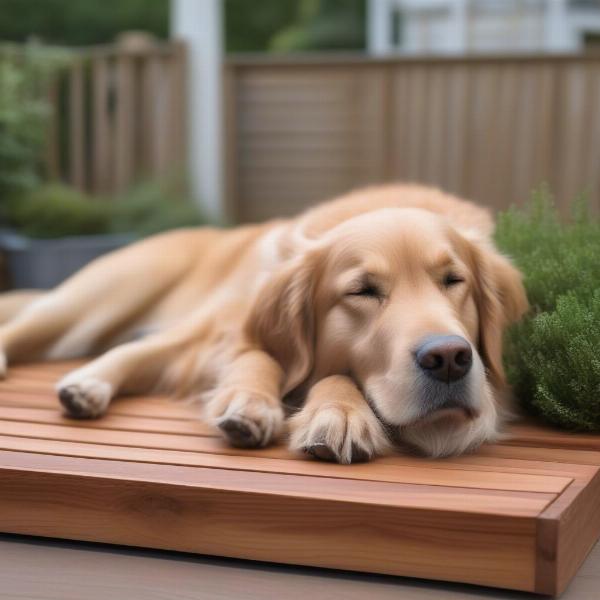Cedar beds for dogs are becoming increasingly popular among pet owners seeking a natural and comfortable sleeping solution for their furry friends. These beds offer a range of benefits, from their pleasant aroma to their potential pest-repelling properties. But are cedar dog beds right for every dog? This article will explore the pros and cons of cedar dog beds, helping you make an informed decision for your canine companion.
Understanding the Appeal of Cedar Dog Beds
Cedar wood is known for its distinct, woody scent, often described as warm and inviting. This natural aroma can create a calming and relaxing environment for your dog, potentially aiding in better sleep.  A dog sleeping peacefully on a cedar bed in a cozy setting. Furthermore, cedar is believed to possess natural insect-repelling properties, which can be beneficial in deterring fleas, ticks, and other pests. This natural defense can be a significant advantage, especially for dogs who spend time outdoors.
A dog sleeping peacefully on a cedar bed in a cozy setting. Furthermore, cedar is believed to possess natural insect-repelling properties, which can be beneficial in deterring fleas, ticks, and other pests. This natural defense can be a significant advantage, especially for dogs who spend time outdoors.
Pros and Cons of Cedar Dog Beds
Like any product, cedar dog beds come with their own set of advantages and disadvantages. Understanding both sides is crucial for making the best choice for your dog.
Pros of Cedar Dog Beds
- Natural Pest Control: The natural oils in cedar wood can help repel fleas, ticks, and other insects, providing a more comfortable and hygienic sleeping environment for your dog.
- Pleasant Aroma: The cedar scent is generally appealing to dogs and can create a calming atmosphere.
- Durability: Cedar wood is naturally durable and resistant to rot and decay, making cedar beds a long-lasting investment.
- Aesthetic Appeal: Cedar beds often have a rustic and attractive appearance that can complement various home decor styles.
Cons of Cedar Dog Beds
- Potential Allergies: Some dogs may be sensitive or allergic to cedar oil, leading to skin irritation or respiratory issues.
- Maintenance: Cedar beds require regular cleaning and maintenance to preserve their effectiveness and prevent the buildup of dirt and allergens.
- Cost: Cedar beds can be more expensive than other dog bed types.
- Splintering: Older or poorly constructed cedar beds can splinter, posing a risk to your dog’s safety.
Choosing the Right Cedar Bed for Your Dog
When selecting a cedar bed, consider your dog’s size, sleeping habits, and any potential allergies. Opt for a bed made of high-quality cedar and ensure it’s well-constructed to minimize the risk of splintering. Elevated cedar beds offer better airflow and can be beneficial for dogs with joint pain. For dogs who like to burrow or feel secure, a covered cedar bed might be a good option.
Maintaining Your Cedar Dog Bed
Regular maintenance is essential to keep your cedar dog bed clean and effective. Vacuum the bed regularly to remove dirt and debris. Wipe down the bed with a damp cloth and mild pet-safe cleaner as needed. Avoid using harsh chemicals that can damage the wood or irritate your dog’s skin.
Conclusion
Cedar beds can offer a comfortable and naturally pest-resistant sleeping solution for your dog. By carefully weighing the pros and cons and choosing a high-quality bed, you can provide your furry friend with a cozy and enjoyable sleeping experience. Remember to monitor your dog for any signs of allergies and maintain the bed regularly to ensure its longevity.
FAQ
- Are cedar beds safe for all dogs? While generally safe, some dogs may have allergies to cedar. Monitor your dog for any signs of irritation.
- How often should I clean my cedar dog bed? Vacuuming should be done weekly, and a thorough cleaning with a damp cloth and pet-safe cleaner should be done monthly.
- Are cedar beds effective against fleas and ticks? Yes, the natural oils in cedar have insect-repelling properties.
- Can cedar beds be used outdoors? While cedar is durable, prolonged exposure to the elements can shorten its lifespan. It’s best to use cedar beds indoors or in covered outdoor areas.
- Are cedar beds expensive? They can be more expensive than other bed types, but their durability often makes them a worthwhile investment.
- What should I do if my dog is allergic to cedar? Discontinue use immediately and consult your veterinarian.
- How can I prevent my cedar bed from splintering? Choose a high-quality, well-constructed bed and inspect it regularly for any signs of damage.
Related Articles
About ILM Dog
ILM Dog is your one-stop resource for all things dog-related. We provide expert advice on dog breeds, health, training, nutrition, grooming, and much more. We are dedicated to helping dog owners worldwide provide the best possible care for their canine companions. Whether you’re looking for information on choosing the right breed or need advice on flea and tick control, ILM Dog has you covered. Contact us today for all your dog-related needs! Email: [email protected]. Phone: +44 20-3965-8624.